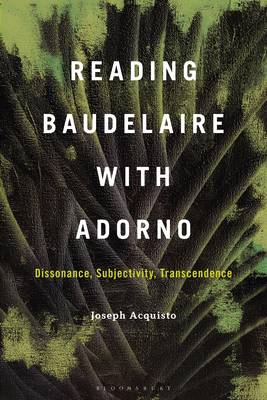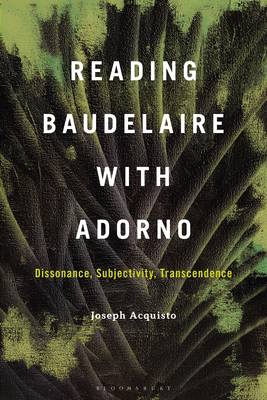
- Afhalen na 1 uur in een winkel met voorraad
- Gratis thuislevering in België vanaf € 30
- Ruim aanbod met 7 miljoen producten
- Afhalen na 1 uur in een winkel met voorraad
- Gratis thuislevering in België vanaf € 30
- Ruim aanbod met 7 miljoen producten
Reading Baudelaire with Adorno
Dissonance, Subjectivity, Transcendence
Joseph AcquistoOmschrijving
Reading Baudelaire with Adorno examines Charles Baudelaire's oeuvre - including verse poems, prose poems, and critical writings - in dialogue with the aesthetic theory of Theodor Adorno, for whom the autonomy of the artwork critically resists any attempt to view it merely as a product of its socio-historic context. Joseph Acquisto analyzes Baudelairean duality through the lens of dissonance, arguing that the figure of the subject as a "dissonant chord" provides a gateway to Baudelaire's reconfiguration of subjectivity and objectivity in both esthetic and epistemological terms. He argues that Baudelaire's dissonance depends on older models of subjectivity in order to define itself via the negation of romantic conceptions of a unified lyric subject in favor of one constituted simultaneously as subject and object.
This new understanding of subjectivity reconfigures our relationship to the work of art, which will always surpass conceptual attempts to know it fully. Acquisto offers a fresh take on some familiar themes in Baudelaire's work. Dissonant subjectivity in Baudelaire, rather than cancelling esthetic transcendence, points to a different way forward that depends on a new and dialectical relation of subject and object.Specificaties
Betrokkenen
- Auteur(s):
- Uitgeverij:
Inhoud
- Aantal bladzijden:
- 200
- Taal:
- Engels
Eigenschappen
- Productcode (EAN):
- 9798765103005
- Verschijningsdatum:
- 1/06/2023
- Uitvoering:
- Hardcover
- Formaat:
- Genaaid
- Afmetingen:
- 152 mm x 229 mm
- Gewicht:
- 435 g

Alleen bij Standaard Boekhandel
Beoordelingen
We publiceren alleen reviews die voldoen aan de voorwaarden voor reviews. Bekijk onze voorwaarden voor reviews.







